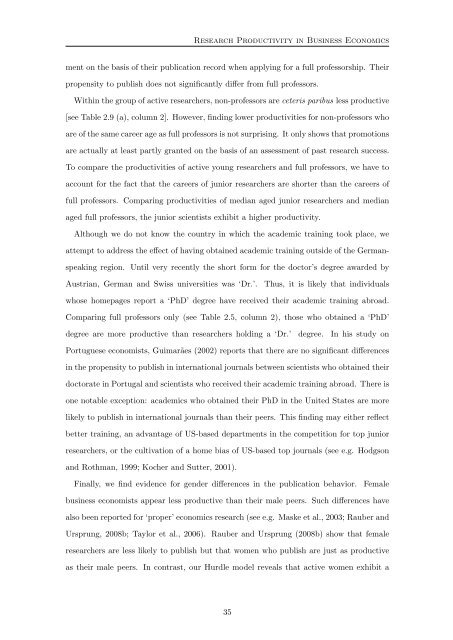Four Essays on University Economics - KOPS - Universität Konstanz
Four Essays on University Economics - KOPS - Universität Konstanz
Four Essays on University Economics - KOPS - Universität Konstanz
You also want an ePaper? Increase the reach of your titles
YUMPU automatically turns print PDFs into web optimized ePapers that Google loves.
Research Productivity in Business Ec<strong>on</strong>omics<br />
ment <strong>on</strong> the basis of their publicati<strong>on</strong> record when applying for a full professorship. Their<br />
propensity to publish does not significantly differ from full professors.<br />
Within the group of active researchers, n<strong>on</strong>-professors are ceteris paribus less productive<br />
[see Table 2.9 (a), column 2]. However, finding lower productivities for n<strong>on</strong>-professors who<br />
are of the same career age as full professors is not surprising. It <strong>on</strong>ly shows that promoti<strong>on</strong>s<br />
are actually at least partly granted <strong>on</strong> the basis of an assessment of past research success.<br />
To compare the productivities of active young researchers and full professors, we have to<br />
account for the fact that the careers of junior researchers are shorter than the careers of<br />
full professors. Comparing productivities of median aged junior researchers and median<br />
aged full professors, the junior scientists exhibit a higher productivity.<br />
Although we do not know the country in which the academic training took place, we<br />
attempt to address the effect of having obtained academic training outside of the German-<br />
speaking regi<strong>on</strong>. Until very recently the short form for the doctor’s degree awarded by<br />
Austrian, German and Swiss universities was ‘Dr.’. Thus, it is likely that individuals<br />
whose homepages report a ‘PhD’ degree have received their academic training abroad.<br />
Comparing full professors <strong>on</strong>ly (see Table 2.5, column 2), those who obtained a ‘PhD’<br />
degree are more productive than researchers holding a ‘Dr.’ degree. In his study <strong>on</strong><br />
Portuguese ec<strong>on</strong>omists, Guimarães (2002) reports that there are no significant differences<br />
in the propensity to publish in internati<strong>on</strong>al journals between scientists who obtained their<br />
doctorate in Portugal and scientists who received their academic training abroad. There is<br />
<strong>on</strong>e notable excepti<strong>on</strong>: academics who obtained their PhD in the United States are more<br />
likely to publish in internati<strong>on</strong>al journals than their peers. This finding may either reflect<br />
better training, an advantage of US-based departments in the competiti<strong>on</strong> for top junior<br />
researchers, or the cultivati<strong>on</strong> of a home bias of US-based top journals (see e.g. Hodgs<strong>on</strong><br />
and Rothman, 1999; Kocher and Sutter, 2001).<br />
Finally, we find evidence for gender differences in the publicati<strong>on</strong> behavior. Female<br />
business ec<strong>on</strong>omists appear less productive than their male peers. Such differences have<br />
also been reported for ‘proper’ ec<strong>on</strong>omics research (see e.g. Maske et al., 2003; Rauber and<br />
Ursprung, 2008b; Taylor et al., 2006). Rauber and Ursprung (2008b) show that female<br />
researchers are less likely to publish but that women who publish are just as productive<br />
as their male peers. In c<strong>on</strong>trast, our Hurdle model reveals that active women exhibit a<br />
35

















